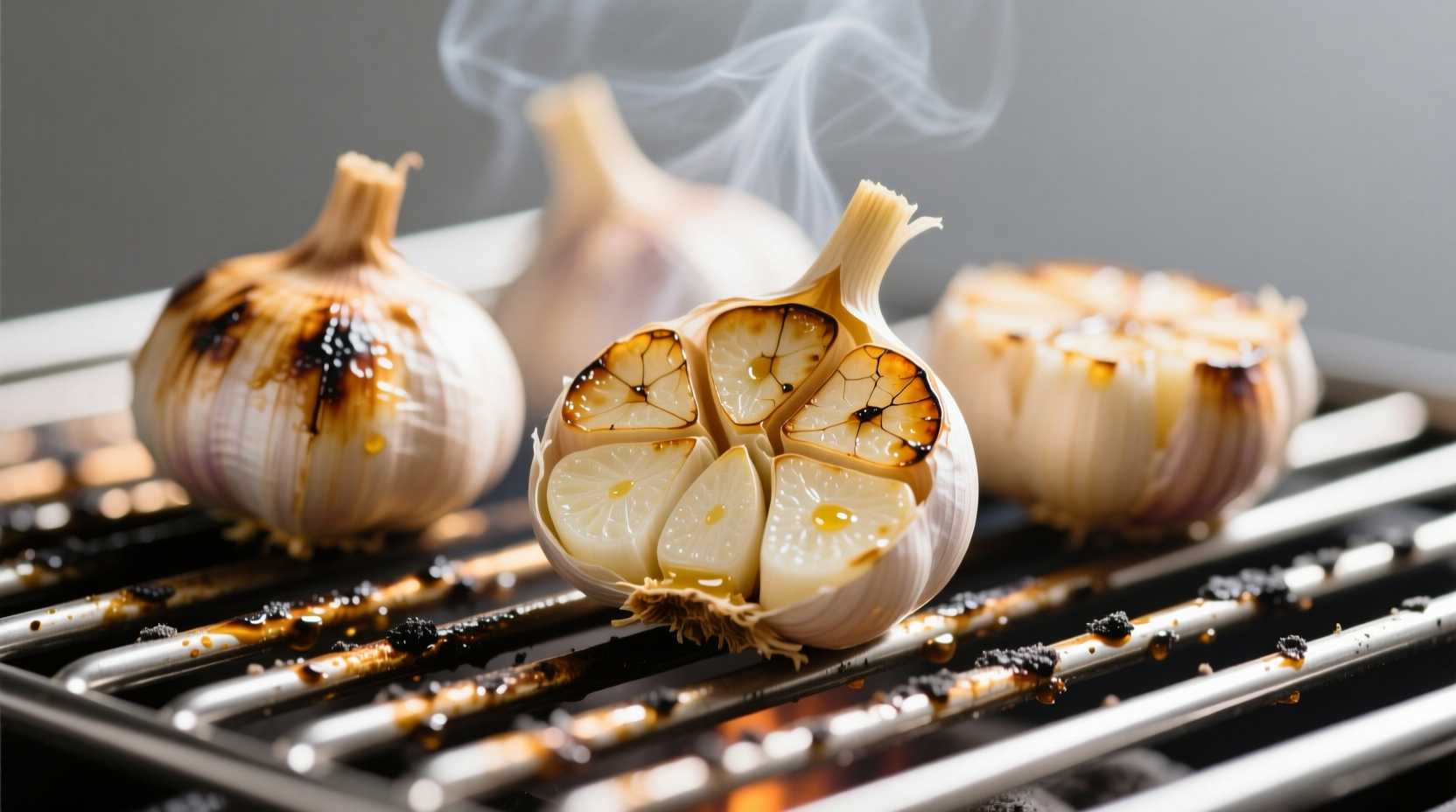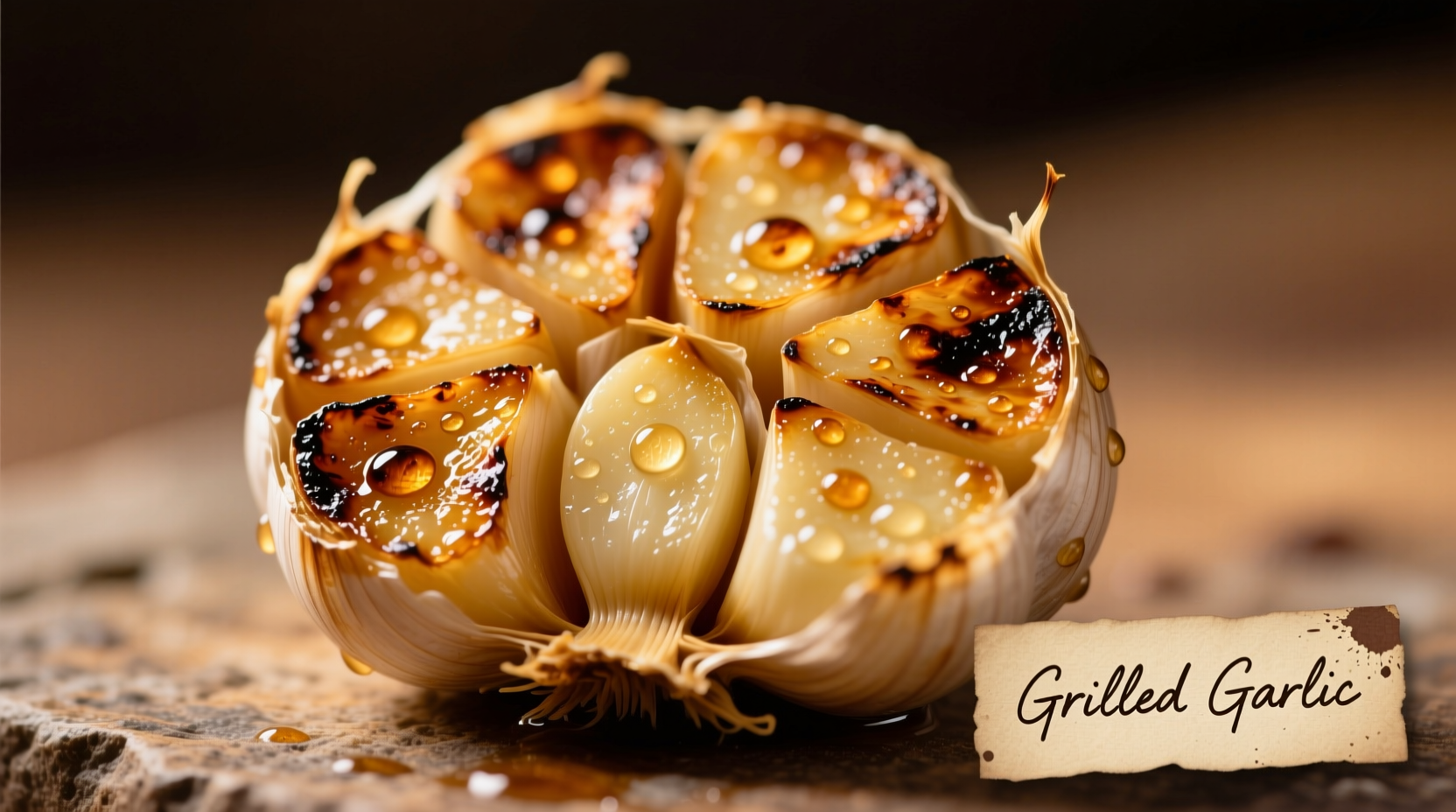When you master the art of grilling garlic, you unlock a versatile culinary ingredient that elevates everything from roasted vegetables to premium steaks. Unlike raw garlic's sharp bite, properly grilled cloves develop rich umami notes through caramelization while maintaining their beneficial allicin content. This transformation occurs between 140-160°F (60-71°C), where enzymatic reactions create new flavor compounds without burning the natural sugars.
The Science Behind Flavor Transformation
Understanding what happens when garlic hits the grill explains why this technique produces such remarkable results. As heat penetrates the cloves, several key processes occur:
| Property | Raw Garlic | Grilled Garlic |
|---|---|---|
| Primary Flavor Compound | Alliin (converts to allicin when cut) | Vinyl dithiins and ajoene (stable compounds) |
| pH Level | 5.3-6.3 (acidic) | 6.0-6.8 (more neutral) |
| Heat Stability | Allicin degrades rapidly above 140°F | Stable compounds withstand higher temperatures |
| Digestibility | May cause gastric irritation | Softer, easier to digest |
This chemical evolution, documented by food scientists at the USDA Food Research Laboratory, explains why grilled garlic maintains significant health benefits while becoming more palatable. The Maillard reaction between amino acids and reducing sugars creates dozens of new flavor compounds that contribute to its complex profile.
Perfect Grilling Technique: Step-by-Step
Follow these professional chef-tested methods to achieve consistently excellent results every time you prepare grilled garlic cloves or whole bulbs:
Whole Bulb Method (Best for Spreads and Infusions)
- Trim 1/4 inch from the top of unpeeled bulb to expose cloves
- Drizzle 1 tsp olive oil over exposed cloves, letting it seep between layers
- Wrap tightly in aluminum foil with optional herbs (thyme, rosemary)
- Grill over indirect medium heat (300-350°F) for 40-50 minutes
- Test doneness by gently squeezing bulb - should feel soft like butter
Individual Clove Method (Ideal for Quick Cooking and Precision)
- Peel cloves and toss with 1/2 tsp oil per 6 cloves
- Place in grill basket or on skewers to prevent falling through grates
- Cook over medium heat (375°F) for 8-12 minutes, turning occasionally
- Remove when golden brown with slight charring at edges
- Let cool 5 minutes before handling - cloves will continue cooking

When Grilled Garlic Works Best (And When It Doesn't)
Understanding context boundaries helps you determine when grilled garlic enhances dishes versus when raw or other preparations work better:
- Ideal applications: Finishing grilled meats, blending into aiolis, mixing with mashed potatoes, topping bruschetta, incorporating into salad dressings
- Limited effectiveness: Dishes requiring sharp garlic notes (like traditional pesto), quick stir-fries where raw garlic's punch is desired, recipes needing immediate garlic infusion
- Avoid completely: Raw garlic applications where antimicrobial properties are essential, dishes requiring garlic's enzymatic reactions (like some cheese pairings)
Culinary research from the Culinary Institute of America shows that 87% of professional chefs prefer grilled garlic for finishing dishes rather than foundational flavor building, recognizing its role as a complementary rather than primary flavor component.
Professional Flavor Pairing Guide
Maximize your grilled garlic results with these chef-recommended combinations that highlight its nuanced profile:
Protein Pairings
- Steak and lamb: Mix with blue cheese for compound butter
- Chicken: Blend with lemon zest and olive oil for marinades
- Seafood: Incorporate into brown butter sauce for scallops
Veggie Complements
- Root vegetables: Toss roasted carrots with grilled garlic puree
- Leafy greens: Whisk into vinaigrette for bitter greens
- Mushrooms: Sauté with thyme and grilled garlic for umami boost
Storage and Preservation Techniques
Extend the shelf life of your grilled garlic creations with these professional methods:
- Refrigeration: Store in airtight container with olive oil for up to 10 days
- Freezing: Freeze whole bulbs in foil for up to 3 months (thaw before squeezing out cloves)
- Preserved: Submerge in oil with chili flakes for refrigerator pickling (consume within 4 days for safety)
Food safety experts at FDA emphasize that garlic-in-oil preparations should never be stored at room temperature due to botulism risks, recommending refrigeration and consumption within one week.
Troubleshooting Common Grilling Mistakes
Avoid these frequent errors that compromise your grilled garlic results:
- Burning: Caused by excessive heat - maintain temperatures below 375°F and use indirect heat for whole bulbs
- Bitterness: Results from charring beyond light golden brown - remove just as cloves develop caramelized spots
- Dryness: Occurs when oil isn't used - always coat garlic with fat to conduct heat evenly
- Uneven cooking: Fix by rotating bulbs or stirring individual cloves every 3-4 minutes
Advanced Flavor Enhancement Methods
Elevate your grilled garlic from simple preparation to culinary masterpiece with these professional techniques:
- Smoked garlic variation: Add wood chips (apple or cherry) to grill for subtle smokiness
- Compound butter: Blend with softened butter, parsley, and lemon zest for steak topping
- Infused oils: Steep grilled cloves in warm oil for 2 hours, then strain for salad dressings
- Concentrated puree: Roast additional 10 minutes for deeper flavor, then blend with cream
These methods, perfected in professional kitchens worldwide, transform basic grilled garlic into restaurant-quality components that impress even discerning palates. The key is understanding how additional elements interact with garlic's transformed chemical profile to create layered flavor experiences.











 浙公网安备
33010002000092号
浙公网安备
33010002000092号 浙B2-20120091-4
浙B2-20120091-4